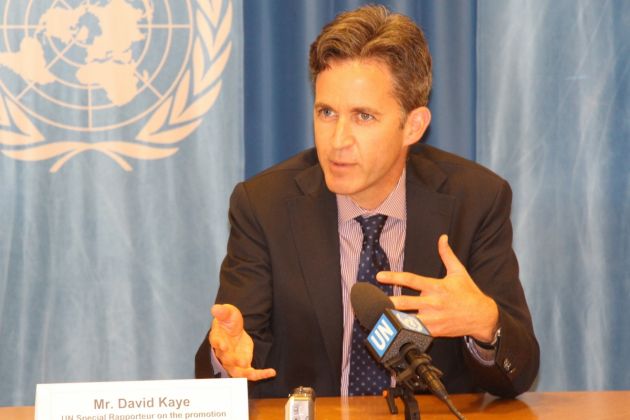Saudis under fire from UN over free speech 'repression'

Geneva – U.N. Human Rights Council member Saudi Arabia faces accusations by eight senior world body experts of launching a wave of repression against free speech and promoting public flogging and execution.
In a Dec. 16 statement the experts called on the desert kingdom to free all its prisoners of conscience.
They spoke out through a statement issued by the office of the High Commissioner for Human Rights Zeid Raad Al Hussein.
It came as efforts were under way around the world to convince the Saudi authorities to lift the death sentence on a well-known poet for "apostasy," or leaving Islam.
Saudi Arabia is one of 13 countries, all Islamic, which prescribe the death penalty for the offence or for blasphemy against religion, according to a report issued last week by the International Humanist and Ethical Union.
The U.N. statement, written by special rapporteur on freedom of opinion and expression David Kaye was endorsed by seven others.
It cited "a string of severe punishments against individuals for the holding and expressing of opinions, including human rights defenders and bloggers Raif Badawi and Mikhlif al Shammari, and the poet Ashraf Fayadh."
It noted, "As the world struggles to fight terrible forms of violence, national authorities everywhere should avoid targeting freedom of expression, especially against those who advocate tolerance, respect and human rights."
The 39-year-old Badawi, was recently awarded the international Sakharov Human Rights Prize named after the late Soviet scientist Andrei Sakharov who publicly challenged his country's Communist rulers in the 1970s and 1980s.
Badawi was sentenced in 2014 to 10 years in prison and 1,000 lashes on charges of "insulting Islam" by his creation of a "Free Saudi Liberals" website.
50 LASHES
Since the first 50 lashes were administered in front of a crowd early this year, the Saudi authorities have kept him in jail but given no indication they will bow to international protests and free him or even cancel the sentence.
Apparently, however, he has not been subject to further corporal punishment.
His wife said after a recent visit that he looked "like a skeleton."
Al Shammari, 60, a Sunni Muslim and former businessman and journalist has been in and out of jail for years for arguing for better treatment for the country's Shia Muslim minority by the country's hardline Sunni rulers.
He had his latest sentence of two years and 200 lashes confirmed by the judicial authorities early this month.
Saudi-born Fayad, won his reputation as a Palestinian poet and was first arrested by the country's religious police in 2013 and rearrested last year on charges based on poems and allegedly blasphemous comments on the social networking site Twitter.
He was originally sentenced to four years in prison and 800 lashes but last month an appeal court changed the sentence to death, and family members and friends say he could be executed at any time.
He once said he was being accused of atheism, a philosophy classified as "terrorist" under Saudi law.
Kaye, whose statement was backed among others by U.N. special rapporteur on freedom of religion and belief Heiner Bielefeldt, the actions by the Saudi authorities "promote fear and intolerance which can resonate beyond Saudi Arabian society."
This was a clear reference to suggestions by human rights groups that the group known as Islamic State group in Iraq and Syria, which has published videos of its own mass executions and other atrocities, takes much of its inspiration from Islamist hard-liners in Saudi Arabia.
Kaye said international law "protects everyone's right to hold opinions without interference and to seek, receive and impart information and ideas of all kinds through any media and regardless of frontiers."
But it does not allow governments to restrict free expression "merely because a person expresses an opinion contrary to popular views or officially-sanctioned beliefs," he added.
